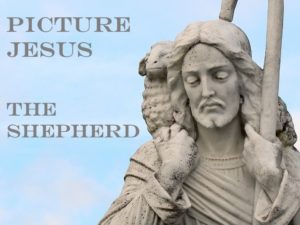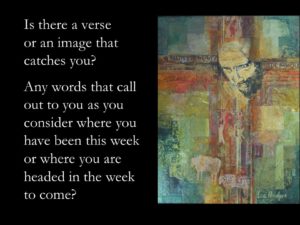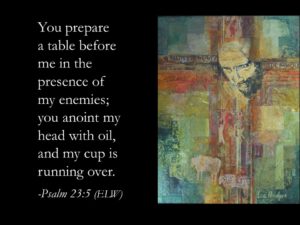On some level, everyone knows Psalm 23. What is it about these words that have stood the test of time and translation and context? What is it about these words that they still provide consolation and hope and a profound connectedness to God?
Psalm 23 (ELW)
1The Lord is my shepherd;
I shall not be in want.
2The Lord makes me lie down in green pastures
and leads me beside still waters.
3You restore my soul, O Lord,
and guide me along right pathways for your name’s sake.
4Though I walk through the valley of the shadow of death, I shall fear no evil;
for you are with me; your rod and your staff, they comfort me.
5You prepare a table before me in the presence of my enemies;
you anoint my head with oil, and my cup is running over.
6Surely goodness and mercy shall follow me all the days of my life,
and I will dwell in the house of the Lord forever.
Without question, the 23rd Psalm, along with maybe the Lord’s Prayer are the two most well-known, ecumenical and perhaps even interfaith writings we have. Seemingly everyone knows some of this beloved Psalm or at least recognizes some of the imagery found there.
Go to a funeral where people gather with diverse faith traditions or even no faith tradition and these words our often able to provide some familiarity, connection and common ground. Why is that? What is it about these words that have stood the test of time and translation and context? What is it about these words that they still provide consolation and hope and a profound connectedness to God?
This week we picture Jesus as “The Shepherd” – the one who lays his life down for his sheep. However, I think in order to more fully understand what Jesus is saying, it would be helpful to go back to Psalm 23 – to hear David, the Psalmist when he offers those first words to God, saying: “The Lord is my shepherd” (Psalm 23:1)
As we look a little deeper at this passage – I’d like to point out some of the subtle changes in language we find from the beginning to the end of this psalm. For example, in the first three verses, God is spoken of in the third person: “The Lord is my shepherd…The Lord makes me lie down…The Lord restores my soul.”
But by the time we get to verse 4, after the Valley of the Shadow of Death, we read: “for you are with me, your rod and your staff, they comfort me” – the third person shifts to the second person, to a more intimate, personal and relational voice.
“Instead of talking about God, the Psalmist begins to talk to God; instead of God in the head, God is a friend in the heart. A conversation happens, a relationship grows” (James Howell).
Finally, the language moves to the first person with the closing verse: “Surely goodness and mercy shall follow me all the days of my life, and I will dwell in the house of the Lord forever” (Psalm 23:6).
One of the interesting aspects of Hebrew scripture, that is lost to most of us, is the many layers of meaning that are found there, most of which is not easily translated into English.
Consider verse 4 again – “Though I walk through the valley of the shadow of death, I shall fear no evil; for you are with me; your rod and your staff, they comfort me” (Psalm 23:4).
The “You” of for you are with me. In the original Hebrew this “You” has exactly 26 words before it and 26 words after it. (James Howell quoting James Limburg, Psalms, Westminster John Knox Press, 2000).
Isn’t that interesting?
And even if you look at the English translation we are using today – there are 59 words before the “You” and again 59 words after it. Perhaps the psalmist, in any language, is boldly declaring that God being with us is at the very center of life.
With this Shepherd God at the center of life, Psalm 23 could be described as a psalm of trust – one written and spoken in the midst of crisis. We don’t know what the particular crisis was, but the language and descriptions are powerful and they capture both the depth of trouble – but also this deep and abiding trust in God’s presence and deliverance.
As you hear and read these words again today, is there a verse or an image that catches you? Any words that strike close to home – or that call out to you as you consider where you have been this past week or where you are headed in the week to come?
Robb McCoy is a Methodist pastor who reflects on the image of the table that God prepares “in the presence of my enemies”. His words, in a way, remind me of the paraphrase of the famous 19th century quote from Commodore Perry: “We have met the enemy and he is us”. He writes:
What if the table that God prepares “in the presence of my enemies,” is really just a table for one?
What if the enemy is within?
I’ve sat with myself on dark and lonely nights.
What if the enemy is my own apathy?
I’ve walked by pain, turned a blind eye to the suffering of my neighbor.
What if the enemy is my own comfort?
I’ve chosen to settle for the inertia of inaction over disrupting the status quo.
What if the enemy is my own pride?
I’ve avoided the one that hurt me. I’ve held onto bitterness, even when the taste in my mouth was too much to bear.
What if the enemy is my own fear?
I’ve walked away from persecution and participated in unjust systems for fear that the wrath would be turned onto me.
What then God? I’ve sat at this table before. I will probably sit at this table again. Still, God meets me there.
At this table there is confession. There is forgiveness. There is grace. There is bread for to eat, and a cup overflowing. There is oil being poured out with such exuberance and abundance it seems shocking. At this table we learn that goodness and mercy are following and will continue to follow in all the days of this life.
A final word study for this morning from verse 6 and the word is “follow”. It turns out that the Hebrew word translated as “follow” is perhaps a little too passive. The connotation that more accurately captures the intent of the word may be more the idea of pursuing or chasing after – so the literal translation from the Hebrew could be better rendered: “No doubt, goodness and kindness will chase after me”.
This may be at the heart of why these words continue to endure for so many. The idea that God does not give up on God’s people.
That goodness and mercy are pursuing us, even when we want nothing more than to run and hide.
That goodness and mercy are pursuing us, even when our apathy and comfort and pride and fear get the best of us. That God is chasing after us for life – new and eternal life.
This is the image of “The Lord as our Shepherd” that begins for us in Psalm 23, the one that Jesus came to embody – the image of Jesus the Good Shepherd who leaves the 99 sheep to search for the one that is lost. The image of the good shepherd who lays down his life for the sheep. The image of the one who calls out to us to follow, the one who is relentless and tireless, the one whose love is fierce and never-failing.
Amen.
Rev. John Berg
Gloria Dei Lutheran Church, Northbrook, IL
________________________________________
Resources:
Dale T. Grandfield, Bible Study: 4 Lent (A), episcopaldigitalnetwork.com
James Howell, April 3, 2011, workingpreacher.org
Rolf Jacobson, March 30, 2014, workingpreacher.org
Robb McCoy, “A Table for One”, February 22, 2014, fatpastor.me




